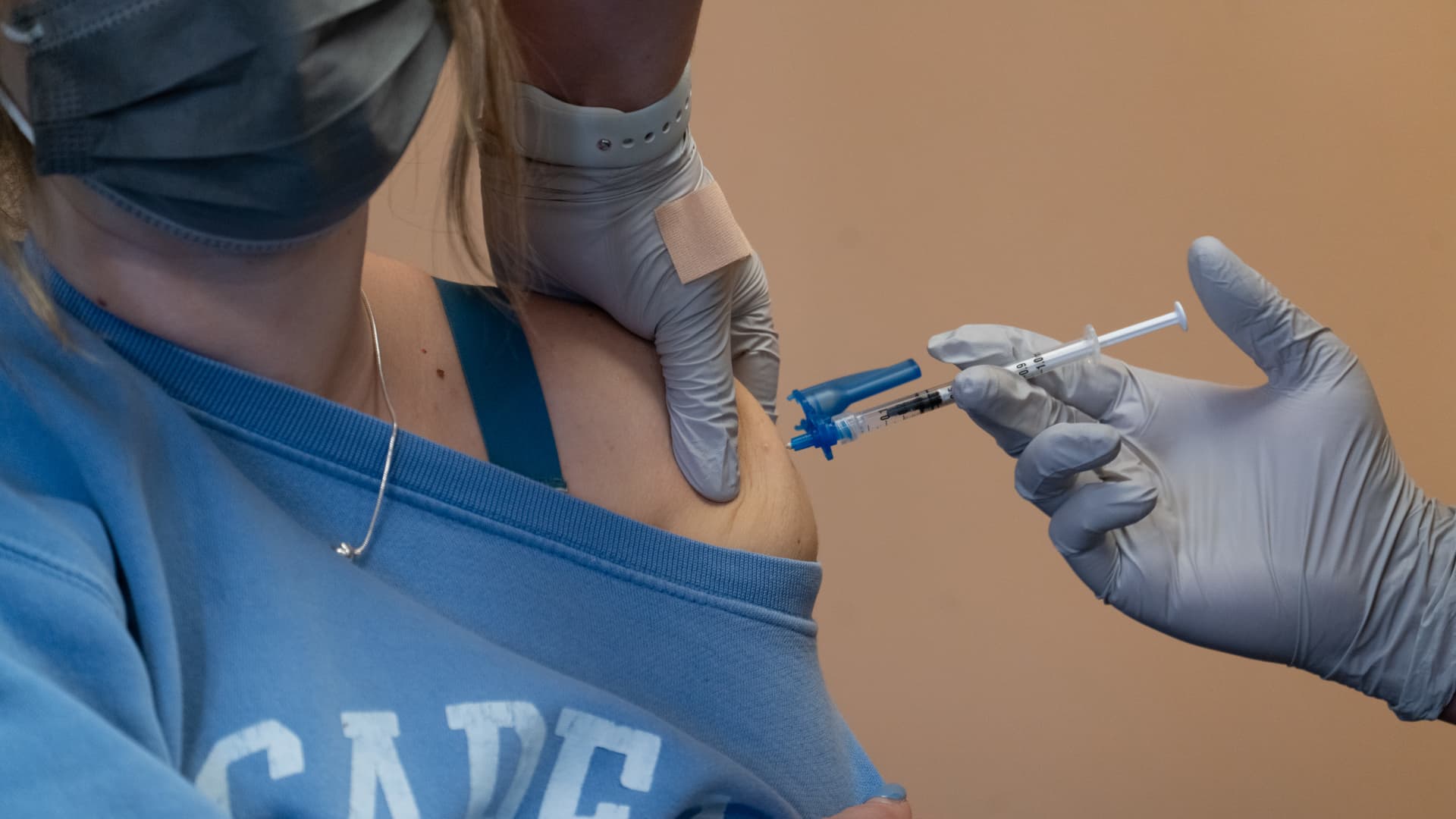
A healthcare worker administers a dose of the Pfizer-BioNTech Covid-19 vaccine at a vaccination clinic in the Peabody Institute Library in Peabody, Massachusetts, U.S., on Wednesday, Jan. 26, 2022.
Vanessa Leroy | Bloomberg | Getty Images
People who caught Covid-19 before they were vaccinated had a weaker immune response to the shots than those who never had the virus, potentially leaving them less protected against reinfection, new research shows.
Co-funded by the National Institutes of Health, the study released Monday challenges older research that suggested a prior Covid infection enhanced a vaccinated individual’s immune response — a phenomenon known as hybrid immunity, which some scientists believe provides the best protection against reinfection.
In the study, researchers from Stanford University analyzed how immune cells found in the blood called CD4+ T cells and CD8+ T cells respond to Covid infection and vaccination. Those cells work together to produce an immune response that can help fend off the virus, killing other cells that have been infected.
The study found that vaccinating people who had never been infected with Covid before produced “robust” CD4+ and CD8+ T cell responses to the virus. Vaccination in those people also generated cell-signaling molecules that recruit other immune cells to help fight Covid, they said. In contrast, researchers said vaccinating people with prior Covid infections produced “considerably lower” cell responses “with less functionality.”
Unvaccinated people who caught Covid had even lower levels of CD8+ T cells, they added.
The researchers said the findings suggest a Covid infection damages an important immune cell response that is crucial to fighting the virus, which might leave vaccinated individuals with a prior infection less protected.
“The apparent damage of the CD8+ T cell response by viral infection is cause for concern, and may leave even vaccinated individuals with a prior infection at risk for subsequent infections or other health issues,” study authors wrote. They also said the findings highlight the need to develop new vaccine strategies that will specifically boost CD8+ T cell responses in people previously infected with Covid.
Dr. Stuart Ray, a professor of medicine at Johns Hopkins University, said the study is surprising since it challenges what is known about hybrid immunity. But he added that “we have to be cautious anytime we’re surprised by something.”
Ray said the findings may stem from the way the study was designed, specifically pointing to how researchers examined immune cells in the blood, not the tissue.
“The cells in the blood are not an absolute measure of everything in the body. The cells we know protect us are also in our tissues fighting infections,” he told CNBC. “It’s like when you’re looking for something under the lamppost when it’s over the field nearby. You might not be looking at all the cells we care about.”
Ray said the study, while interesting, needs to factor in long-term knowledge about how Covid immunity works: “It’s probably not the last chapter in this story.”
The study comes as researchers continue to investigate Covid’s impact on individuals even after they recover from the virus, which has infected more than 100 million people in the U.S. alone since the outset of the pandemic. The nation continues to see nearly 150,000 new cases each week, according to the Centers for Disease Control and Prevention.
The new research also comes as public health officials consider new approaches to Covid vaccination that could decrease the number of doses people need per year or require drugmakers to periodically update their shots to target emerging variants of the virus.
Roughly 81% of the U.S. population is vaccinated with at least one Covid shot, while nearly 70% have completed their primary series doses, according to the Centers for Disease Control and Prevention.







